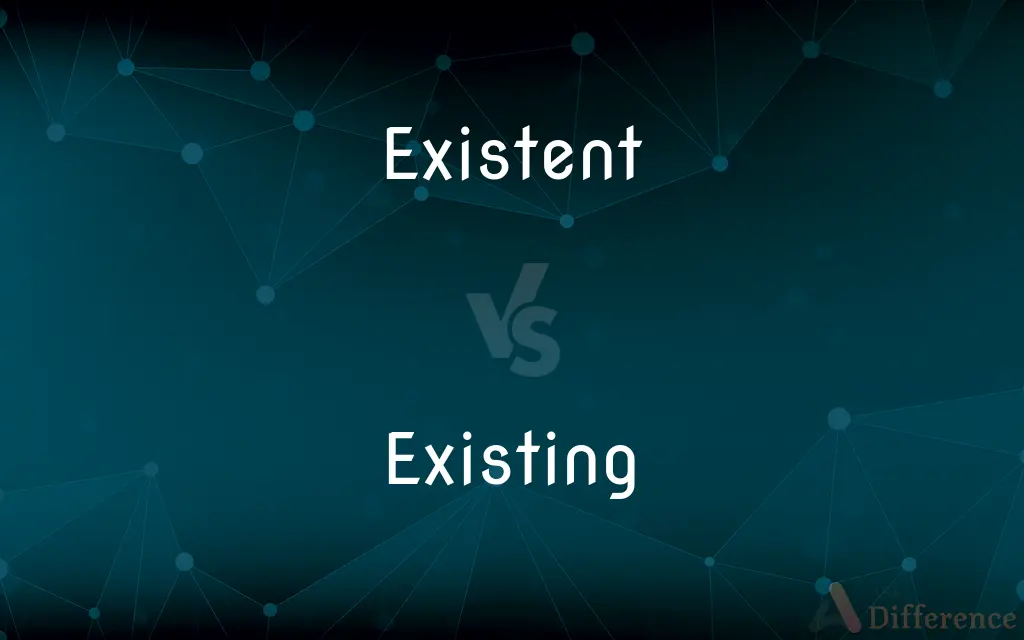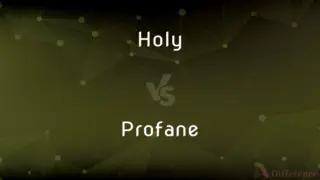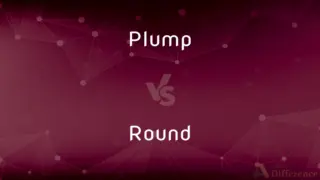Existent vs. Existing — What's the Difference?
By Fiza Rafique & Urooj Arif — Updated on March 28, 2024
Existent emphasizes the state of having existence, often in a philosophical context, while existing focuses on currently being or occurring in reality.

Difference Between Existent and Existing
Table of Contents
ADVERTISEMENT
Key Differences
Existent is often used to discuss concepts or entities in a broad, sometimes philosophical manner, suggesting that something is merely capable of existence or is existent within a certain framework or theory. On the other hand, existing is used more practically, referring to things that are present, operational, or in effect at the current moment, without implying any broader existential significance.
While existent can pertain to ideas or entities considered within the realm of possibility or within specific contexts (e.g., "existent theories of the universe"), existing typically relates to the concrete or factual presence of something ("existing laws"). This difference underscores the philosophical versus practical nature of their usage.
The term existent can evoke a sense of abstractness, being suitable for discussions that are theoretical or speculative in nature. It implies a focus on the condition of having existence. Conversely, existing is anchored in the tangible and the immediate, emphasizing the current state or condition of being.
In literary or academic contexts, existent might be chosen to evoke a more nuanced or profound sense of being, particularly when discussing the nature of existence itself. Meanwhile, existing is straightforward and is commonly used in everyday language to refer to things that are known to be alive, present, or operational.
The choice between existent and existing often depends on the context and the desired connotation. Existent might be preferred in philosophical discourse or when contemplating the essence of being, whereas existing is favored for practical, factual, or current scenarios, reflecting a difference in focus from theoretical to tangible.
ADVERTISEMENT
Comparison Chart
Usage Context
Philosophical, abstract
Practical, concrete
Implication
Possibility of existence, theoretical presence
Factual presence, operational or current state
Focus
Essence or condition of being
Current, tangible state of being
Common Contexts
Theoretical discussions, philosophical texts
Everyday language, practical discussions
Nature
More abstract, speculative
More concrete, factual
Compare with Definitions
Existent
Speculative or potential presence.
Existent technologies in science fiction often inspire real-world innovations.
Existing
Operational or in effect.
The existing laws need to be revised to reflect our current values.
Existent
Having an essence or form.
The soul's existent nature continues to be debated among philosophers.
Existing
Currently present or alive.
Existing species of birds are cataloged in this comprehensive guide.
Existent
Present in theory or concept.
The concept of parallel universes is intriguing yet only existent in scientific hypotheses.
Existing
In current use or practice.
Existing medical treatments for the disease are effective, but research continues.
Existent
Capable of existence.
Existent forms of life beyond Earth are a subject of speculation.
Existing
Actively functioning or available.
The existing support systems for the homeless are underfunded.
Existent
Philosophically acknowledged as being.
Discussions about what is existent challenge our understanding of reality.
Existing
Physically present.
The existing structures were considered in the urban development plan.
Existent
Having life or being; existing.
Existing
To have actual being; be real.
Existent
Existing; having life or being, current; occurring now
Existing
To have life; live
One of the worst actors that ever existed.
Existent
(archaic) a being or entity that exists independently
Existing
To live at a minimal level; subsist
Barely enough income on which to exist.
Existent
Having being or existence; existing; being; occurring now; taking place.
The eyes and mind are fastened on objects which have no real being, as if they were truly existent.
Existing
To continue to be; persist
Old customs that still exist in rural areas.
Existent
Having existence or being or actuality;
An attempt to refine the existent machinery to make it more efficient
Much of the beluga caviar existing in the world is found in the Soviet Union and Iran
Existing
To be present under certain circumstances or in a specified place; occur
"Wealth and poverty exist in every demographic category" (Thomas G. Exter).
Existent
Being or occurring in fact or actuality; having verified existence; not illusory;
Real objects
Real people; not ghosts
A film based on real life
A real illness
Real humility
Life is real! Life is earnest!
Existing
Present participle of exist
Existent
Presently existing in fact and not merely potential or possible;
The predicted temperature and the actual temperature were markedly different
Actual and imagined conditions
Existing
That exists, or has existence, especially that exists now.
Existing
Having existence or being or actuality; as, much of the beluga caviar existing in the world is found in the Soviet Union and Iran. Opposite of nonexistent.
Existing
Present. Opposite of absent.
Existing
Presently existing; as, the existing system.
Existing
Having existence or being or actuality;
An attempt to refine the existent machinery to make it more efficient
Much of the beluga caviar existing in the world is found in the Soviet Union and Iran
Existing
Presently existing;
The existing system
Common Curiosities
Can a concept be both existent and existing?
A concept can be existent in theory and existing if it has a tangible or operational presence in reality.
Can something be existent but not existing?
Yes, something can be considered existent in theory or potential without being currently existing or tangible.
Is the use of existent common in everyday language?
No, existent is less common in everyday language and more often found in philosophical or theoretical discussions.
Does existent imply potentiality?
Yes, existent can imply potentiality or the theoretical possibility of being.
Is existing always tangible?
Existing often implies tangibility, but it can also refer to practices, laws, or conditions that are in effect.
Can non-physical concepts be considered existing?
Non-physical concepts, like laws or practices, can be considered existing if they are in effect or operationally present.
What is an example of something existing?
Laws that are currently in effect or operational technologies are examples of existing entities.
How do philosophers view the term existent?
Philosophers may use existent to discuss the essence of being or the theoretical possibilities of existence.
What does existent mean?
Existent refers to the state of having existence, often used in a broader or philosophical context.
How is existing different from existent?
Existing focuses on being present, operational, or in effect in the current reality, unlike the more abstract or theoretical implications of existent.
What is an example of something existent?
Theoretical concepts or potential forms of life beyond Earth are examples of things that might be described as existent.
Can existing refer to future conditions?
Existing typically refers to the current state, not future conditions, which are potential or planned.
Is there a difference in the formality of existent and existing?
Existent may sound more formal or philosophical, while existing is straightforward and used in everyday contexts.
How does language affect the perception of existent vs. existing?
Language can shape our understanding of these terms, with existent invoking more abstract or theoretical considerations, and existing implying more concrete or factual realities.
Are existent and existing interchangeable?
While there can be overlap, they are not fully interchangeable due to their different implications and contexts of use.
Share Your Discovery

Previous Comparison
Holy vs. Profane
Next Comparison
Plump vs. RoundAuthor Spotlight
Written by
Fiza RafiqueFiza Rafique is a skilled content writer at AskDifference.com, where she meticulously refines and enhances written pieces. Drawing from her vast editorial expertise, Fiza ensures clarity, accuracy, and precision in every article. Passionate about language, she continually seeks to elevate the quality of content for readers worldwide.
Co-written by
Urooj ArifUrooj is a skilled content writer at Ask Difference, known for her exceptional ability to simplify complex topics into engaging and informative content. With a passion for research and a flair for clear, concise writing, she consistently delivers articles that resonate with our diverse audience.














































